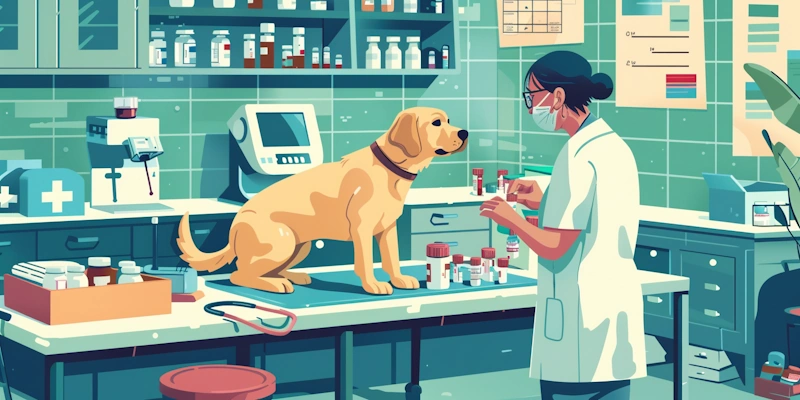Allergies are a common health issue in dogs, just as they are in humans. They can significantly impact your dog's quality of life, causing discomfort and leading to more serious health problems if left untreated. This blog post will delve into the various types of allergies that affect dogs, their causes, symptoms to watch for, and effective treatment options.
Types of Canine Allergies
Understanding the different types of allergies that can affect dogs is the first step in managing them effectively. Canine allergies can be broadly categorized into three types: food allergies, environmental allergies, and flea allergies.
1. Food Allergies

Food allergies in dogs are caused by an immune response to certain proteins found in their diet. Common culprits include beef, chicken, dairy, and grains.
Symptoms:
- Itchy skin, particularly around the face, ears, paws, and rear
- Gastrointestinal issues such as vomiting and diarrhea
- Chronic ear infections
- Hair loss and skin infections
2. Environmental Allergies

Environmental allergies, also known as atopic dermatitis, occur when a dog’s immune system reacts to substances in their surroundings. These allergens can include pollen, mold, dust mites, and grasses.
Symptoms:
- Itching and scratching, especially on the feet, belly, and ears
- Red, inflamed skin
- Recurrent ear infections
- Respiratory issues, although less common
3. Flea Allergies

Flea allergy dermatitis is a reaction to flea saliva. Even a single flea bite can cause severe itching and discomfort in sensitive dogs.
Symptoms:
- Intense itching and scratching, particularly around the base of the tail
- Red, inflamed skin and sores
- Hair loss
- Presence of flea dirt (tiny black specks) on the skin
Causes of Canine Allergies
The exact cause of allergies in dogs can vary, but they generally stem from an overactive immune system that mistakenly identifies harmless substances as threats. Here’s a closer look at the causes for each type of allergy:
- Food Allergies: These are typically caused by a genetic predisposition. Dogs can develop allergies to foods they have been eating for a long time.
- Environmental Allergies: These are often seasonal, triggered by allergens such as pollen and mold spores. Other environmental allergens like dust mites and dander can cause year-round symptoms.
- Flea Allergies: Caused by flea bites, specifically the saliva injected during a bite. Even minimal exposure can trigger a reaction in allergic dogs.
Symptoms of Canine Allergies
Recognizing the symptoms of allergies in dogs is crucial for early intervention and effective treatment. Here are some common signs to watch for:
- Skin Symptoms: Itching, redness, inflammation, sores, and hair loss.
- Gastrointestinal Symptoms: Vomiting, diarrhea, and changes in appetite.
- Ear Symptoms: Frequent scratching at the ears, head shaking, and recurrent ear infections.
- Respiratory Symptoms: Sneezing, coughing, and wheezing (more common in environmental allergies).
Diagnosing Canine Allergies
Diagnosing allergies in dogs involves a combination of history taking, physical examinations, and specific tests. Here are some common diagnostic methods:
- Elimination Diets: For food allergies, a veterinarian may recommend an elimination diet to identify the offending ingredient. This involves feeding your dog a novel protein source (one they haven't eaten before) and a carbohydrate for several weeks.
- Allergy Testing: Blood tests or intradermal skin tests can help identify environmental allergens. These tests involve exposing your dog to small amounts of common allergens and observing their reactions.
- Flea Control Trials: To diagnose flea allergies, veterinarians may recommend a strict flea control regimen to see if symptoms improve.
Treatment of Canine Allergies

Treatment options for canine allergies vary depending on the type and severity of the allergy. Here’s an overview of effective treatments:
1. Food Allergies
- Dietary Management: The primary treatment for food allergies is avoiding the allergen. This involves feeding your dog a hypoallergenic diet or a diet with novel protein sources.
- Supplements: Omega-3 fatty acids can help reduce inflammation and improve skin health.
2. Environmental Allergies
- Medications: Antihistamines, corticosteroids, and immune-modulating drugs can help manage symptoms.
- Immunotherapy: Allergy shots or oral drops containing small amounts of the allergens can help desensitize your dog's immune system over time.
- Environmental Control: Regular cleaning, using air purifiers, and avoiding known allergens can reduce exposure.
3. Flea Allergies
- Flea Control: Strict flea control using topical or oral flea preventatives is essential. This includes treating all pets in the household and the environment.
- Medications: Anti-inflammatory medications and antibiotics may be needed to treat secondary infections caused by scratching.
Preventive Measures
Preventing allergies in dogs involves minimizing exposure to known allergens and maintaining overall health. Here are some preventive measures:
- Regular Grooming: Regular baths and grooming can help remove allergens from your dog's coat and skin.
- Healthy Diet: Feeding a balanced, high-quality diet supports overall health and a robust immune system.
- Flea Prevention: Consistent use of flea preventatives can prevent flea infestations and subsequent allergic reactions.
- Environmental Management: Keep your home clean, use air purifiers, and reduce dust and mold to minimize environmental allergens.
Conclusion
Understanding canine allergies and their causes, symptoms, and treatments is crucial for ensuring your dog's comfort and well-being. By recognizing the signs and seeking appropriate veterinary care, you can manage your dog's allergies effectively and improve their quality of life. With the right approach, you can help your furry friend lead a happy, healthy, and itch-free life.